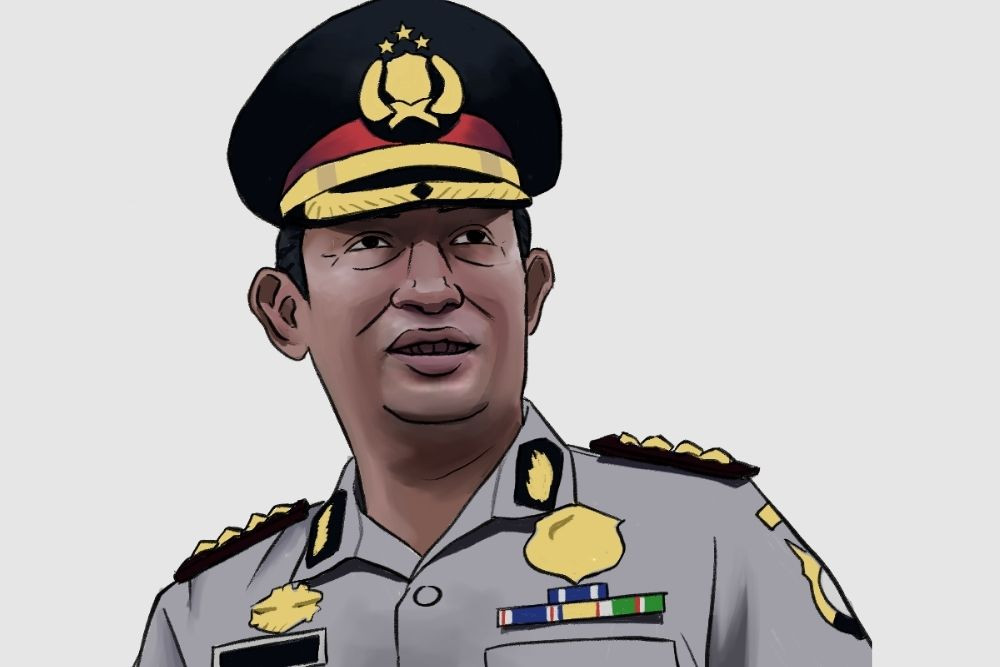Popular Reads
Top Results
Can't find what you're looking for?
View all search resultsPopular Reads
Top Results
Can't find what you're looking for?
View all search resultsListyo seeks ‘humane’ law enforcement, more surveillance
Top cop wants to set up ‘virtual police’, revive civilian security force
Change text size
Gift Premium Articles
to Anyone
T
he recent House of Representatives confirmation hearing for National Police chief Comr. Gen. Listyo Sigit Prabowo has painted a somewhat contradictory picture of how the 51-year-old general will lead the force.
Listyo, who is known for his close ties to President Joko “Jokowi” Widodo, has promised to promote a soft and more “humane” approach to law enforcement, raising hopes that he could finally put an end to rampant police violence.
However, his plans to intensify public surveillance across the archipelago, repurpose the civil security apparatus and create a new cyber police unit to counter online misinformation have sparked human rights and security concerns.
"A soft approach would be the main policing strategy for the National Police [during my tenure]. [I want the police] to be firm but humane in enforcing the law," Listyo told lawmakers during his confirmation hearing on Wednesday. "I wish to transform the police force so they can meet the public’s expectations by prioritizing the public interest, enforcing the law fairly for all, guarding democracy and respecting human rights.”
Listyo, whom the House confirmed as the nation’s new top cop on Thursday, expressed his wish to bring the police closer to the public by prioritizing preventive measures, negotiation and restorative justice. He promised to address criticisms of the police, which have included allegations of corruption and the excessive use of force.
The police were in the spotlight recently after graft fugitive Djoko Tjandra claimed to have bribed two police generals so that he could avoid arrest while traveling to Indonesia. Under Listyo’s then-leadership of the police’s criminal investigation unit, the two generals, Brig. Gen. Prasetyo Utomo and Insp. Gen. Napoleon Bonaparte, were charged with bribery.
The police also came under fire for their excessive use of force while handling nationwide protests against the Job Creation Law last year. At least 411 people in 15 provinces fell victim to police violence, and 6,658 people in 21 provinces were arrested during and after the protests, according to Amnesty International Indonesia.
The police are currently under scrutiny after the National Commission on Human Rights indicated that officers might be culpable in the deaths of at least four members of the now-banned Islam Defenders Front (FPI) in Kerawang, West Java, in December 2020. The commission said they were unlawfully killed.
In addition to changing the face of the police force, Listyo is also planning to make use of new technologies and to engage the community more. Human rights groups, however, have rung alarm bells for some of his plans.
For instance, Listyo is planning to establish so-called “virtual police” officers who will work with social media influencers to educate the public about the proper and ethical use of digital platforms. Critics, however, fear that the policy would lead to greater online surveillance and further shrink online civic space.
Offline, Listyo wants to incorporate CCTVs operated by government agencies, private institutions, public places and residential areas into the National Police system so that authorities can better identify criminals, a plan that has raised concerns over privacy violations.
Institute for Policy Research and Advocacy (ELSAM) deputy director Wahyudi Djafar said the policy could lead to privacy breaches, especially because Indonesia did not have any laws in place to regulate the use of CCTV.
"We don't have any data protection act stipulating the use of CCTV, such as requirements for surveillance warning signage or a regulation on who can access CCTV footage and how long it may be stored. Unless we have clear regulations, the policy could easily violate our privacy rights," Wahyudi said on Thursday.
The new chief’s other controversial plan is his intention to revive the civilian security force (Pam Swakarsa). He said a new National Police chief regulation regarding the private security apparatus would allow him to grant private security guards (Satpam) and members of the community watch (Satkamling) certain police functions under the force’s discretion.
Bambang Rukminto of the Institute of Security and Strategic Studies (ISESS) expressed concern that reviving Pam Swakarsa would create horizontal conflicts.
"The civil security apparatus, such as the community watch, does not have training or standard operational procedures for carrying out duties. These non-professionals could, therefore, be prone to abusing their position and flaunting their authority. The regulation would only promote thuggery and incite horizontal conflicts," Bambang said.
Wahyudi noted that the public had already had a bad experience with a previous incarnation of Pam Swakarsa, which was reportedly established to break up the 1998 demonstrations that brought down then-president Soeharto.










